云谷是一所怎样的学校?
回看初心,当初选择参与创建云谷,简单说,就是带着“使命”来、为了“理想”来。当初马老师(马云)提出说要办一所面向未来的学校,为中国教育的改革做一些努力和尝试,这也是我一直想去尝试的事情。
什么样的教育是中国孩子需要的?
下面这张图曾经给我极大的触动:学校不是一个工厂,教育也不该成为“塑造”孩子的机器,教育不是一场战争,不是激烈的角逐,教育应该是有感情、有温度的,它的过程是缓缓展开的,像一棵树一样自然生长。
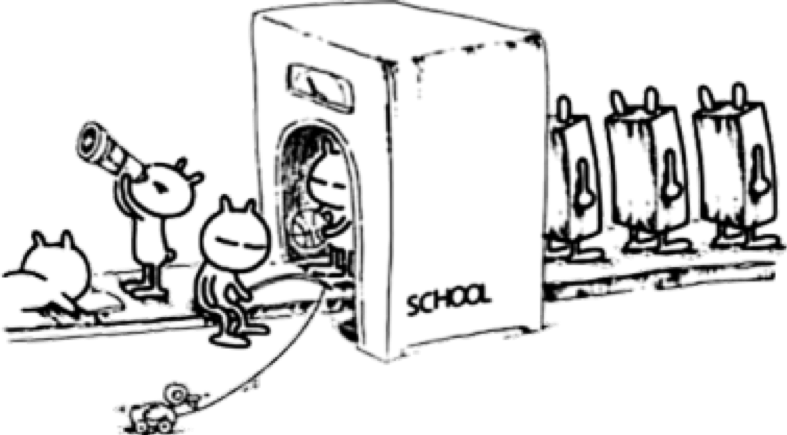
在孩子理应充分汲取灵感和养料的校园里,我们不能用一张成绩单去锁定孩子的潜力和未来。朱永新先生有一本书叫《我的理想教育》对我影响很大,他提出“让孩子过幸福而完整的校园生活”,这也是云谷对教育最朴素的愿望。
什么样的教育是面向未来的?
在思考未来时,不妨先看看、我们这一代成年人对学习的定义。过去我们觉得学习就是学知识。显然在当下,单靠有限的知识无法应对时代了。
在未来社会,飞速更新迭代的知识是学不完的,学习的内涵和外延需要被更多教育者看见——持续学习的动力和能力、思考问题的方式、追求幸福的愿望是能跟随人、影响人一生的东西。作为接受传统教育长起来的一代,我们并不否认它确有值得借鉴之处,但单靠这些远远不够。“未来”听起来是个很虚的词,谁都不能精准地预测未来是什么样,但教育者可以依据趋势去系统地分析,面向未来的人需要具备哪些素养和能力,孩子需要去学那些真正值得学习的东西。
在创校之初,我们和马老师清晰地对标了云谷对于学生的培养目标,我们认为,“具有仁爱精神、独立意志、社会担当、终身学习力和幸福感的地球公民”是面向未来的孩子画像。在过去两年半的实践里,基于这个目标,云谷人将它进一步细化拆分,产出了云谷学生素养框架——也就是说,在以能力和素养为导向的云谷课程与育人行为,将紧紧围绕着两大核心品格、三大基础能力、三大关键能力进行。

从创校第一天开始,我们就坚定地朝这个云谷的愿景走:办一所创新型的、面向未来的学校,期望能通过科技的力量,让优质教育惠及更多的孩子——从理念到一步一步落地的尝试,从小创新一点一点迭代,初心从未改变。
很多人称云谷为一所“创新型国际学校”,那么创新是否意味着推翻重来?在我看来,云谷的创新、传承与坚守是同步进行的,创新型学校也不意味着把一切推翻重来,所以云谷的创新不是颠覆。云谷对创新有三个层面的思考:通过教学创新、文化创新,最终长成“具有创新力的人”。
教育是一个“古老”的行业,有它特定的规律和原则,创新不能违背教育规律。在传承中创新,在创新中坚守,这是任何一个教育者都要遵循的。云谷是一所中国学校,课程采用国家大纲,教学基于国家教材。不一样的地方是什么呢?就是“教学法”的创新,老师们是对教学的方法、路径、形式、策略做创新,这也是对老师来说最大的挑战所在。
“课程”其实是一个广泛的概念,我认为,孩子在学校一切经历和体验的设计都是课程。与之对应的,“教学”的内涵也有了更丰富的延展。我们需要重新定义教与学,比如:把素养和能力融合进每一堂课的设计,打散重构,以单元或者融合课程的形式去教;孩子们可以在博物馆课程里学、在“西溪湿地”主题的PBL项目里学、在开放型话题的“车轮式辩论”里学、在DT课上大谷粒为小谷粒设计一个玩具中学……在云谷,教什么、怎么教;学什么、怎么学都在不断创新和迭代。
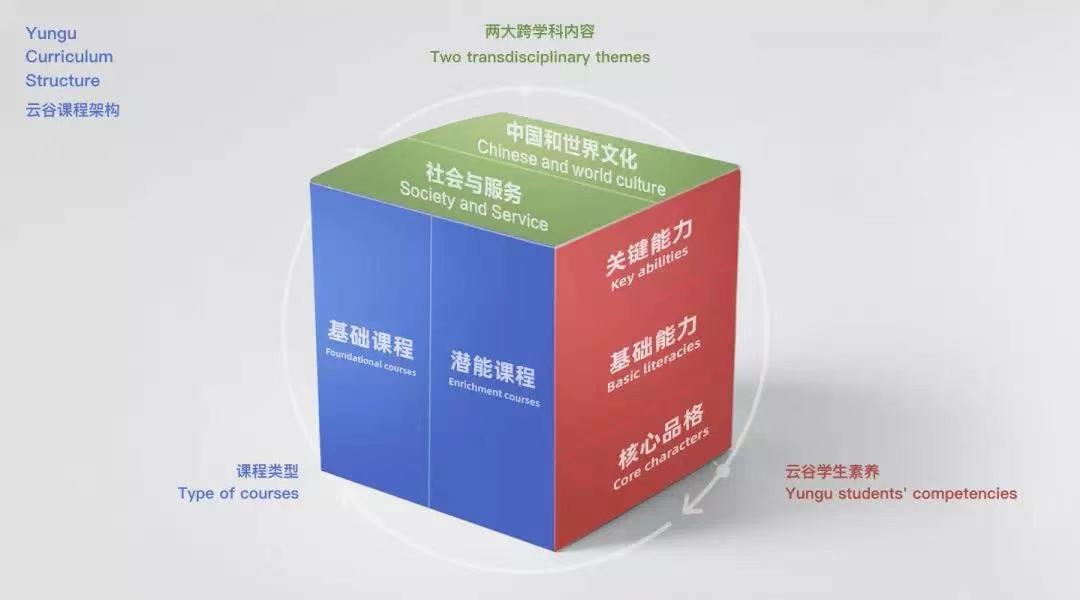
云谷的“创新”还是一种文化,是一种精神,它最大的帮助是让我们打破思维定式来思考问题。就拿我自己的感受来说,来云谷之前的多年校长经历,让我有时也会用“惯性”凭经验快速做决策。但是进入云谷尤其是和阿里人一起共事之后,我发现,对云谷这所有创新基因的学校来说,打破思维惯性,换个角度看问题是一种珍贵的思维方式。既要考虑那些有价值的积累和经验,也要提醒自己不要掉进经验主义的坑。
所以在遇事的时候,我们经常会多问自己一句:可不可以这样做?是不是只能这样做?还有没有更好的方法试试?我在云谷做校长的准则是不给自己设限,也不要给老师设限。会给老师空间把诉求说出来、想法长出来,所以在云谷,共同创造、共生共长的文化,是长在云谷的基因和土壤里的,老师不是教书匠,每一个老师都是教学的创新者、学校的创造者。
云谷所有创新的“目的”都是为了人。基于教学创新和文化创新,我们希望云谷人最终长成“有行动力的创新者”。这样的创新者具有自我认知、自我优化、自我成长的,是能用高阶思维去判断、思考和解决问题的,当Ta有更强大的力量时,会去影响周边、改变世界。落到实践中,如何把握创新之度?怎么判断一件事该“变”还是“不变”?这就要基于我们所相信的“以人为本”的教育理念。
我经常说,云谷最大的不同就是看见人、“视人为人”。在面对抉择的时候,是把追求学校的名声、奖牌放在前面,把成绩、排名放在前面,还是把孩子和老师作为一个鲜活个体的真实情感和需求放在前面?一所校园是由人构成的,“人”的发展是云谷一切工作的原点和终点,这也是我们在做选择和判断时考量的唯一标准。我们是不是做到了“以学生为中心的课堂”?是不是做到了“以老师为中心的学校”?带着欣赏的眼光看孩子,带着感恩的心看老师,让人成为人,让人成为完整幸福的人,寻求、创造人之为人的价值——这样的文化是深深扎在云谷根基上的。
这几年,云谷校园里出现最高频的一个词就是“育人”,云谷的育人观指向全人的发展,在素养导向的课程实施中,最应该被珍视的就是一个个与众不同的个体,他们兴趣爱好不同、学习风格有差异、意志品格不同、能力水平相差。于是我们构建出了对谷粒们个性化成长支持的生态,也在逐渐构建对每一个老师的支持生态。长远一些来看,我们希望以人为本的理念影响范围更广,不仅是对学生、对老师、对家长,还要对社区甚至社会更大的范围都能有所影响。人的成长是需要周期的,教育是农业,是一件慢的事情,不是马上付出投入就会有产出。我特别感动于马老师的一番话,当时我问云谷成熟需要多少年,马老师跟我们说,给云谷三十年,用小火慢炖的心态搞教育。“牵着蜗牛去散步”,慢不等于无为,现在的慢是为了未来的快。
衡量云谷这所学校是否成功的标准是什么?这个问题要从我们对成功的定义谈起。面向未来,孩子的成功和老师的成功需要被重新定义。孩子长成什么样子,才算是成功?有钱、社会地位高,那不是成功。我认为,对世界有自己独立的思考和认识,能打理好自己的生活并且有幸福生活的能力,对新事物不抗拒有学习和接纳的能力,知道自己想要什么,知道如何去追逐热爱的东西,对他人和与自己不同的群体满怀善意和尊重,会与人合作懂得如何与伙伴达成共识,有责任有担当不是“精致的利己主义者”,这样的孩子就是一个成功的人。
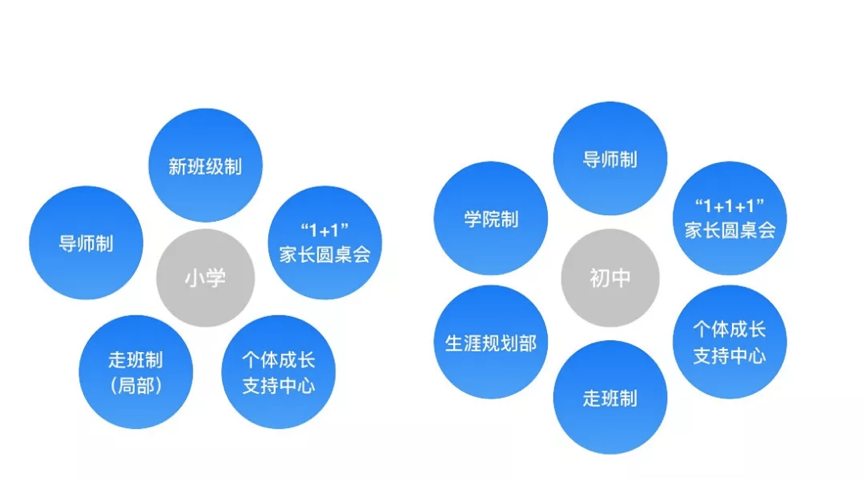
那怎么定义云谷的教育是否成功?在云谷,我们期望孩子眼里有光、内心有梦。一个孩子不论学习能力高低,眉眼、肢体、心灵都是舒展的,他们品德好,待人接物时落落大方。而学习方面,以能力和素养为导向的教育,孩子的学术能力不会差,因为他们的理解、运用、表达都比单纯记忆更深入,而且解决问题的能力、自主学习的能力、探究创新的能力更强。
上半年,我们绘制出了小学段和初中段的谷粒画像。小学是:舒展又明礼,好奇又专注的皮实小孩。初中是:善于合作、乐于探究,积极追逐梦想的阳光少年。
如果说小学段我们侧重于对孩子天性与特质的保护,那么到了初中,就是把这种特质进一步延伸和夯实,在兴趣之上长出热爱。在九年级的学生身上,我已经看到了这种生长的力量。他们经过了三年的浸润,对自己想去哪里逐渐清晰,在目标的驱动下,发自内心地去奋斗、去争取。孩子的这些变化是让我能切实感受到教育的力量和价值的,这些变化才是了不起的。
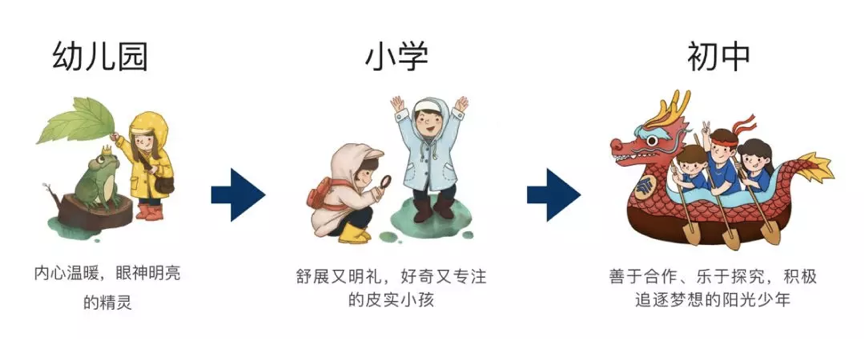
所以从人的角度来说,我们一方面努力打开孩子精神上的那扇“窗”,另一方面尽量给孩子提供了更多未来能力的支架,当越来越多的孩子从外显的舒展走向内在更高阶的改变——被激发之后小宇宙爆发而主动追求自己的热爱,这就是云谷教育真正的价值:对孩子的一生产生影响。虽然我们才做了短短的两年尝试,但是我笃定地相信这就是云谷前行的方向。
基于这样的相信,评价老师是否“成功”的方式也需要被重新定义。考高分、考名校、拿多少奖不再是老师们的“考核指标”。对云谷的老师来说,看到一个学生因为教育而发生变化,产生的正向影响贯穿孩子的一生,这会是最有价值感的时刻。
事实上,云谷也面临着“世俗观念”的压力。我相信在未来,云谷的社会认可度会更高,但现在我们怎么样更坚定自己的方向和目标,就要求教育者能有更强大的内心,更坚定去走这条我们相信的路,“戴着镣铐跳舞”。所以云谷选老师的标准很不一样,就是会考量“价值观”,是不是真的热爱教育,是不是真的爱孩子,是不是真的用心去支持你的导生。
我们经常用这三个词形容云谷的老师:理想者、梦想家、行动派,是能真正带着理念落实到行动的人。除了价值观,云谷会全力支持老师的成长,既能从老师需要具备的“高位均衡”综合能力给予支持,又能助推老师拥有学术和专业上的“两把刷子”。我希望每个老师来到这里,都能收获能力、眼界和格局。
格局更大,对教育的理解也会更深刻,理念变化以后,他看待人、看待世界的方式也会发生变化,从而给他的教育行为和家庭也带来无形的影响。云谷实际的教育场景更像是老师们的“PBL”,设计课程、活动,老师自己解决问题的能力和探索欲望也在不停地上台阶。
什么样的家庭和孩子适合云谷?
其实很难用一个数据化的标准来对标,因为云谷是不用什么学历、在什么岗位去区分家长的。适合云谷的家庭首先价值观肯定是要一致的,我们要对教育有共同的想法和追求,而家长也是真的愿意跟我们一起去尝试、去改变、去成长。如果家长只看分数,只看表面上的东西,感受不到孩子的改变,看不到软实力,那就是不适合云谷。以前我们对云谷家长有过四个期待:对教育有热忱,对学校有信任,对孩子会等待,对自己有要求。
面对大环境焦虑很正常,但父母要先让自己成长,再期待孩子进步——父母好好学习,孩子天天向上。除了淡定,还要有科学的策略和方法,在云谷学校里有一所父母学校——云谷学堂,就是给父母搭一个学习和交流的场子,帮助他们学习做更好的父母。
什么样的家庭不适合云谷?学校慢慢会有一些共识,更多是对家长的。比如:冲着马老师的名头但根本不知道云谷实际要做什么的“慕名而来型父母”;亲子关系很弱,把孩子送进学校就撒手不管,没有学习意愿,也不想成为更好的家长的“佛系型父母”;啥都想要,眼睛只盯着孩子不好的地方的“贪心型父母”;过于模糊家长和学校职责的界限,忽略自己“育”职责,反而觉得自己对“教法”有绝对正确的理解的“教学专家型父母”。
当然,这个世界上没有完美的父母,或多或少都会有“不完美”,云谷愿意助力家长实现自我成长。父母作为“育”的中坚力量,是学校最亲密的伙伴,只有共识,才有实现我们共同教育愿景和理想的可能。

